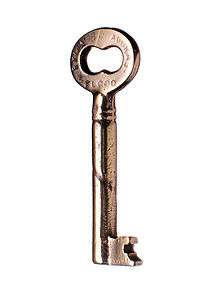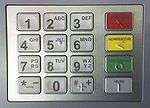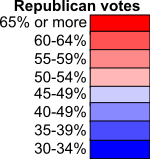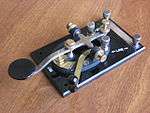Definify.com
Webster 1913 Edition
Key
Key
(kē)
, Noun.
[OE.
keye
, key
, kay
, AS. cæg
.] 1.
An instrument by means of which the bolt of a lock is shot or drawn; usually, a removable metal instrument fitted to the mechanism of a particular lock and operated by turning in its place.
2.
A small device which is inserted into a mechanism and turned like a key to fasten, adjust, or wind it;
as, a watch
key
; a bed key
; the winding key
for a clock, etc.4.
A position or condition which affords entrance, control, pr possession, etc.;
as, the
. key
of a line of defense; the key
of a country; the key
of a political situationHence,
that which serves to unlock, open, discover, or solve something unknown or difficult;
as, the
Similarly, see also senses 14 and 15. key
to a riddle; the key
to a problem. Those who are accustomed to reason have got the true
key
of books. Locke.
Who keeps the
keys
of all the creeds. Tennyson.
5.
That part of a mechanism which serves to lock up, make fast, or adjust to position.
6.
(Arch.)
(a)
A piece of wood used as a wedge.
(b)
The last board of a floor when laid down.
7.
(Masonry)
(a)
A keystone.
(b)
That part of the plastering which is forced through between the laths and holds the rest in place.
8.
(Mach.)
(a)
A wedge to unite two or more pieces, or adjust their relative position; a cotter; a forelock.
See Illusts. of Cotter
, and Gib
. (b)
A bar, pin or wedge, to secure a crank, pulley, coupling, etc., upon a shaft, and prevent relative turning; sometimes holding by friction alone, but more frequently by its resistance to shearing, being usually embedded partly in the shaft and partly in the crank, pulley, etc.
9.
(Bot.)
An indehiscent, one-seeded fruit furnished with a wing, as the fruit of the ash and maple; a samara; – called also
key fruit
. 10.
(Mus.)
(a)
A family of tones whose regular members are called diatonic tones, and named key tone (or tonic) or one (or eight), mediant or three, dominant or five, subdominant or four, submediant or six, supertonic or two, and subtonic or seven. Chromatic tones are temporary members of a key, under such names as “ sharp four,” “flat seven,” etc. Scales and tunes of every variety are made from the tones of a key.
(b)
The fundamental tone of a movement to which its modulations are referred, and with which it generally begins and ends; keynote.
Both warbling of one song, both in one
key
. Shakespeare
11.
Fig: The general pitch or tone of a sentence or utterance.
You fall at once into a lower
key
. Cowper.
Key bed
. Same as
– Key seat
. Key bolt
, a bolt which has a mortise near the end, and is secured by a cotter or wedge instead of a nut.
Key bugle
. See
– Kent bugle
. Key of a position
or
Key of a country.
(Mil.)
See
– Key
, 4. Key seat
(Mach.)
, a bed or groove to receive a key which prevents one part from turning on the other.
– Key way
, a channel for a key, in the hole of a piece which is keyed to a shaft; an internal key seat; – called also
– key seat
. Key wrench
(Mach.)
, an adjustable wrench in which the movable jaw is made fast by a key.
– Power of the keys
(Eccl.)
, the authority claimed by the ministry in some Christian churches to administer the discipline of the church, and to grant or withhold its privileges; – so called from the declaration of Christ, “I will give unto thee the keys of the kingdom of heaven.”
Matt. xvi. 19.
Key
,Verb.
T.
[
imp. & p. p.
Keved
; p. pr. & vb. n.
Keying
.] 1.
To fasten or secure firmly; to fasten or tighten with keys or wedges.
Francis.
To key up
. (a)
(Arch.)
To raise (the whole ring of an arch) off its centering, by driving in the keystone forcibly.
(b)
(Mus.)
To raise the pitch of.
(c)
Hence,
(fig.)
, to produce nervous tension in;
as, the whole team was
.keyed up
for the championship gameWebster 1828 Edition
Key
KEY
,Noun.
ke.
1.
An instrument for shutting or opening a lock, by pushing the bolt one way or the other. Keys are of various forms, and fitted to the wards of the locks to which they belong.2.
An instrument by which something is screwed or turned; as the key of a watch or other chronometer.3.
The stone which binds an arch. [See Key-stone.]4.
In an organ or harpsichord, the key, or finger key is a little lever or piece in the fore part by which the instrument is played on by the fingers.5.
In music, the key, or key note, is the fundamental note or tone, to which the whole piece is accommodated, and with which it usually begins and always ends. There are two keys, one of the major, and one of the minor mode. Key sometimes signifies a scale or system of intervals.6.
An index, or that which serves to explain a cypher. Hence,7.
That which serves to explain any thing difficult to be understood.8.
In the Romish church, ecclesiastical jurisdiction, or the power of the pope, or the power of excommunicating or absolving.9.
A ledge or lay of ricks near the surface of the water. 10. The husk containing the seed of an ash.
KEY
,Noun.
Definition 2026
Key
key
key
See also: Key
English

A key (object designed to open and close a lock)

A numeric keypad with 16 keys
The keys of a musical keyboard.

The key of a map.

A telegraph key
Noun
key (plural keys)
- An object designed to open and close a lock.
- 1913, Joseph C. Lincoln, chapter 13, in Mr. Pratt's Patients:
- We tiptoed into the house, up the stairs and along the hall into the room where the Professor had been spending so much of his time. 'Twas locked, of course, but the Deacon man got a big bunch of keys out of his pocket and commenced to putter with the lock.
-
- An object designed to fit between two other objects (such as a shaft and a wheel) in a mechanism and maintain their relative orientation.
- A crucial step or requirement.
- The key to solving this problem is persistence.
- the key to winning a game
- John Locke (1632-1705)
- Those who are accustomed to reason have got the true key of books.
- Alfred Tennyson (1809-1892)
- who keeps the keys of all the creeds
- A guide explaining the symbols or terminology of a map or chart; a legend.
- The key says that A stands for the accounting department.
- A guide to the correct answers of a worksheet or test.
- Some students cheated by using the answer key.
- (computing) One of several small, usually square buttons on a typewriter or computer keyboard, mostly corresponding to text characters.
- Press the Escape key.
- (music) One of a number of rectangular moving parts on a piano or musical keyboard, each causing a particular sound or note to be produced.
- (music) One of various levers on a musical instrument used to select notes, such as a lever opening a hole on a woodwind.
- (music) A hierarchical scale of musical notes on which a composition is based.
- the key of B-flat major
- 1881, R.L. Stevenson, Virginibus Puerisque:
- A girl, it is true, has always lived in a glass house among reproving relatives, whose word was law; she has been bred up to sacrifice her judgments and take the key submissively from dear papa; and it is wonderful how swiftly she can change her tune into the husband's.
- (figuratively) The general pitch or tone of a sentence or utterance.
- William Cowper (1731-1800)
- You fall at once into a lower key.
- William Cowper (1731-1800)
- (botany) An indehiscent, one-seeded fruit furnished with a wing, such as the fruit of the ash and maple; a samara.
- (historical) A manual electrical switching device primarily used for the transmission of Morse code.
- (cryptography) A piece of information (e.g. a passphrase) used to encode or decode a message or messages.
- (Internet) A password restricting access to an IRC channel.
- 2000, "Robert Erdec", Re: Help; mIRC32; unable to resolve server arnes.si (on newsgroup alt.irc.mirc)
- if you know someone who is in the channel, you can query them and ask for the key.
- 2000, "Robert Erdec", Re: Help; mIRC32; unable to resolve server arnes.si (on newsgroup alt.irc.mirc)
- (databases) In a relational database, a field used as an index into another table (not necessarily unique).
- (computing) A value that uniquely identifies an entry in an associative array.
- (basketball) The free-throw lane together with the circle surrounding the free-throw line, the free-throw lane having formerly been narrower, giving the area the shape of a skeleton key hole.
- He shoots from the top of the key.
- (biology) A series of logically organized groups of discriminating information which aims to allow the user to correctly identify a taxon.
- (slang) Kilogram (though this is more commonly shortened to kay).
- 2010, David J. Silas, Da Block (page 41)
- So starting with ten keys of cocaine and two keys of heroin, Derrick put his plan in motion. Soon every major drug dealer and gang chief from Chicago Avenue to Evanston was in his pocket.
- 2010, David J. Silas, Da Block (page 41)
- (architecture) A piece of wood used as a wedge.
- (architecture) The last board of a floor when laid down.
- (masonry) A keystone.
- That part of the plastering which is forced through between the laths and holds the rest in place.
- (rail transport) A wooden support for a rail on the bullhead rail system.
- (heraldic charge) The object used to open or close a lock, often used as a heraldic charge.
- The coat of arms of Regensburg is gules two keys in saltire argent.
- The degree of roughness, or retention ability of a surface to have applied a liquid such as paint, or glue.
- The door panel should be sanded down carefully to provide a good key for the new paint.
Hyponyms
Hyponyms of key
|
|
Derived terms
Terms derived from key
Related terms
Related terms
Translations
device designed to open and close a lock
|
|
object used to maintain the orientation between two others
crucial step
|
small guide explaining symbols or terminology
button on a typewriter or computer keyboard
|
|
part of a piano or musical keyboard
|
|
scale of musical notes
|
|
device used to transmit Morse code
cryptography: piece of information used to encode or decode
|
|
computing: field of a database constrained to be unique
computing: field in a record used as a search argument
computing: value uniquely identifying entry in associative array
biology: information to correctly identify a taxon — see clavis
See also
Adjective
key (comparative more key, superlative most key)
- Indispensable, supremely important.
- He is the key player on his soccer team.
- 2007, Mark H. Moss, Shopping as an Entertainment Experience (page 46)
- Lukas intimates that one of Disney's key attractions was "Main Street USA,” which "mimicked a downtown business district just as Southdale" had done.
- Important, salient.
- She makes several key points.
- 2006, Edwin Black, chapter 2, in Internal Combustion:
- Throughout the 1500s, the populace roiled over a constellation of grievances of which the forest emerged as a key focal point. The popular late Middle Ages fictional character Robin Hood, dressed in green to symbolize the forest, dodged fines for forest offenses and stole from the rich to give to the poor. But his appeal was painfully real and embodied the struggle over wood.
Usage notes
The first meaning is distinguished by the definite article, as seen in the quotations.
Translations
indispensable
|
|
important
Verb
key (third-person singular simple present keys, present participle keying, simple past and past participle keyed)
- To fit (a lock) with a key.
- To fit (pieces of a mechanical assembly) with a key to maintain the orientation between them.
- To mark or indicate with a symbol indicating membership in a class.
- 1996 January, Garden Dsign Ideas, second printing, Taunton Press, ISBN 1561580791, page 25,
- So I worked on a tissue-paper copy of the perimeter plan, outlining groupings of plants of the same species and keying them with letters for the species.
- 2001, Bruce M. Metzger, The Bible in Translation, ISBN 0801022827, page 87,
- The volume closes with thirty pages of "Notes, critical and explanatory," in which Thomson provides seventy-six longer or shorter notes keyed to specific sections of the synopsis.
- 2002, Karen Bromley, Stretching Students' Vocabulary, ISBN 0439288398, page 12,
- Talk about similarities between the words and write them below to the left of the anchor, keying them with a plus sign (+). Talk about the characteristics that set the words apart and list them below the box to the right, keying them with a tilde sign (~).
- 2007, Stephen Blake Mettee, Michelle Doland, and Doris Hall, compilers, The American Directory of Writer's Guidelines, 6th ("2007–2008") edition, ISBN 1884956580, page 757,
- Indicate the comparative value of each heading by keying it with a number in pencil, in the left margin, as follows: […]
- 1996 January, Garden Dsign Ideas, second printing, Taunton Press, ISBN 1561580791, page 25,
- (telegraphy and radio telegraphy) To depress (a telegraph key).
- (radio) To operate (the transmitter switch of a two-way radio).
- (computing) (more usually to key in) To enter (information) by typing on a keyboard or keypad.
- Our instructor told us to key in our user IDs.
- (colloquial) To vandalize (a car, etc.) by scratching with an implement such as a key.
- He keyed the car that had taken his parking spot.
- To link (as one might do with a key or legend).
- 1960, Richard L. Masland, "Classification of the Epilepsies", in Epilepsia, volume 1, page 516,
- The American Heart Association has prepared their own guide to classification and, keying it with the Standard Nomenclature of Diseases, have done much to encourage a concise yet complete diagnosis.
- 2006, Deborah Blum, Mary Knudson and Robin Marantz Henig, A Field Guide for Science Writers: The Official Guide of the National Association of Science Writers, page 63:
- It also features special issues on "Live Longer, Better, Wiser," men's health, women's health, and issues keyed to important "disease weeks."
- 1960, Richard L. Masland, "Classification of the Epilepsies", in Epilepsia, volume 1, page 516,
- (intransitive, biology, chiefly taxonomy) To be identified as a certain taxon when using a key.
- To fasten or secure firmly; to fasten or tighten with keys or wedges.
- (Can we find and add a quotation of Francis to this entry?)
Derived terms
Translations
computing: enter (information)
Etymology 2
Variant of cay, from Spanish cayo.
Alternative forms
Noun
key (plural keys)
- One of a string of small islands.
- "the Florida Keys"
Translations
small island
Anagrams
Etymology 3
Noun
key (plural keys)
- Alternative form of quay
Manx
Etymology 1
Noun
key m (genitive singular [please provide], plural [please provide])
Derived terms
Etymology 2
Noun
key m (genitive singular keyee)
Mutation
| Manx mutation | ||
|---|---|---|
| Radical | Lenition | Eclipsis |
| key | chey | gey |
| Note: Some of these forms may be hypothetical. Not every possible mutated form of every word actually occurs. | ||